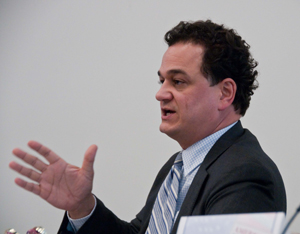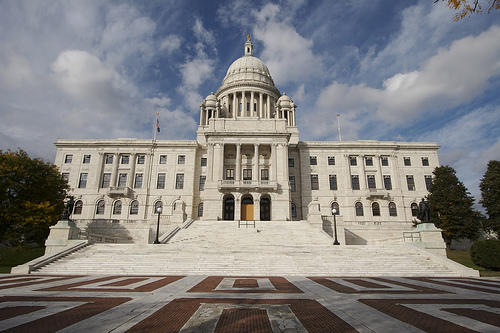
Business leaders, legislators, academics, researchers, students and social entrepreneurs from across the country gathered March 16 and 17 for a two-day conference at Brown University to advance social enterprise as a new paradigm for economic development.
In a speech Saturday, Rep. David Cicilline, D-R.I., said he was drafting the first proposed national legislation to directly support social enterprise — an emerging movement that innovates new business models to help solve social and environmental ills.
“You are the game-changers we need, you are the economic engine regenerating our communities,” Cicilline said. “Social enterprise has the greatest potential to deliver the products and services that solve the major challenges we face. It’s a movement whose time has come.”
Cicilline is committed to introducing social enterprise legislation in the next several weeks, according to a senior staffer. His proposed draft legislation would amend the Small Business Act to direct the Small Business Administration to aid and assist small businesses that are mission-driven enterprises by providing access to capital and technical assistance and establishing an Office of Social Entrepreneurship, and it would identify ways the government could leverage existing programs and resources to better support nonprofit social enterprises.
With the former mayor’s announcement of in-the-works federal legislation, which was greeted by great applause inside Alumnae Hall, the city, the state and its elected officials have now clearly emerged as leaders and innovators within a national movement toward social enterprise, largely catalyzed by Social Venture Partners of Rhode Island (SVPRI).
The Social Enterprise Ecosystem Economic Development (SEEED) Summit was organized by SVPRI in partnership with Brown University and with the support of a number of nonprofits, corporations and foundations, including The Rhode Island Foundation and the Rhode Island Council for the Humanities.
If the collapsing economic system were the Titanic, then social enterprise is one of the lifeboats. Social enterprise encompasses often-visionary yet eminently practical business structures, where profit motive meets social mission and community focus merges with global thinking to solve pervasive problems.
A social enterprise can be a for-profit company with a social mission, or a nonprofit that operates an aligned for-profit business to help sustain its operations, according to Kelly Ramirez, executive director of Social Venture Partners of Rhode Island.
About 90 percent of U.S. consumers identify themselves as socially responsible, and there are more than 30,000 social enterprises nationwide, according to SVPRI’s Mary Bergeron.
Social enterprise is a nascent movement searching to define itself with a new lexicon for new structures and new ways of thinking. A social enterprise ecosystem is the social, organizational and financial infrastructure — the fertile soil — needed for the “seed” of a social venture to take root and grow. Well-developed ecosystems or developing hubs are emerging in Durham, N.C., Seattle and Cincinnati.
These enterprises fills both mission and economic niches in their communities, and are a vital part of the answer to commonly faced problems. Cicilline understood this implicitly when he said at the close of the conference:
“Our social entrepreneurs have the talent, the drive and the ability to leverage a relatively small amount of dollars into enough resources to identify and implement solutions to some of the most pressing challenges in our community, in our country and in our world. It’s economic imperative, it’s a social imperative, it’s a moral imperative and it cuts across partisanship, and it’s right here in your home town, or it’s halfway around the world.”
… read the full story on ecoRI News.







